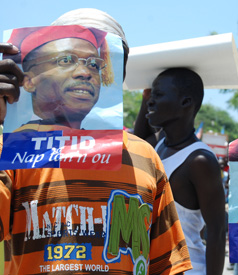Port-au-Prince, Haiti – Days after Haitians watched an exiled dictator come home, a former president issued a statement on Wednesday that fueled rumors that he, too, was angling to return.
The former president, Jean-Bertrand Aristide, a onetime priest of the slums who became Haiti’s first democratically elected president, said he was prepared to return home “today, tomorrow and at any time.” Mr. Aristide was ousted in 2004 in the midst of growing unrest and under intense pressure from the United States.
In a statement posted on the Internet, Mr. Aristide said he was eager to return “to contribute to serving my Haitian sisters and brothers as a simple citizen in the field of education.” Later, he added that because he had a serious eye condition, his doctors had recommended that he not spend another winter in South Africa, where he has lived in exile since leaving Haiti.
It was not the first time that Mr. Aristide had talked publicly of his desire to return to Haiti, but his statement — which read more like a plea — threatened to fuel tensions already stirred by the surprise return on Sunday of the former dictator Jean-Claude Duvalier.
Mr. Duvalier’s emergence from exile has not only threatened to complicate the country’s unresolved presidential election, but has also energized Mr. Aristide’s supporters. There has been a persistent flurry of speculation that Mr. Aristide, who rose to power as a champion of Haiti’s poor but became notorious for his violent crackdowns of political dissent, has been hopscotching across Central America and the Caribbean in anticipation of making his own surprise re-entry.
Mr. Aristide’s travels, however, have been limited because he does not have a valid Haitian passport. The nation’s president, René Préval, once a political protégé of Mr. Aristide’s, has refused to issue him a new one. More importantly, political analysts here said, his return would not be supported by either the United States or France, Haiti’s most important allies.
“Aristide could have 15 passports and he’s still not going to come back to Haiti,” said one analyst, who asked not to be identified because he was close to the Haitian government and was not authorized to speak to the media. “France and the United States are standing in the way.”
Mr. Aristide, who remains popular among the poor, appealed to the people in his statement.
“Despite the enormous challenges they face in the aftermath of the Jan. 12, 2010, earthquake,” he said, “their determination to make the return happen has increased.”
© 2010 The New York Times Company
Truthout has licensed this content. It may not be reproduced by any other source and is not covered by our Creative Commons license.
Join us in defending the truth before it’s too late
The future of independent journalism is uncertain, and the consequences of losing it are too grave to ignore. To ensure Truthout remains safe, strong, and free, we need to raise $44,000 in the next 6 days. Every dollar raised goes directly toward the costs of producing news you can trust.
Please give what you can — because by supporting us with a tax-deductible donation, you’re not just preserving a source of news, you’re helping to safeguard what’s left of our democracy.
